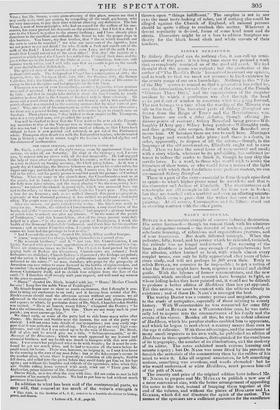SIDNEY HERESFORD.
IF Sidney Bere.cford can do nothing else, it can call up remi- niscences of the past : it is a long time since we perused a work that so completely reminded us of the good old novel. We had thought that the genus was extinct ; but the production of the author of "The Biredit's Bride" has arrived to correct our opinien, and to teach us that we must not presume to limit existence by the scanty range of our own knowledge. Nothing io this " Tale of the Day. ()veers to remind us that a gem:rat:en has rolled by, save the introduction, towards the close of the story, of the French "Clorieus Three Days," and the nppropriation of the singular accident by which a gentleman was shet through the head as he put it out of window to ascertain wleit was going forward. The rest Indones to a time when the worship of the Minerva was rife its the land. The historical pots of Sidney Beresprd are drawn from the Reign of Terror and the Revolutiouary war. The heroes are each a lithe& _Ideates, though offering ju- dicious peints of contrast ; Sidney Beresford being grave—Wil- loughby D'Arey gay ; Sidney being prudent—Willoughby rash, and thus getting into scrapes, from which the Beresford may rescue him. . Of heroines there are two to each hero. Marriages both happy and wretched take place; and there is a death, ia order, apparently, to dispose of all the actors,—though, in the language of the old no' el-readers, Elizabeth ought not to have died. Then we have the usual loves of man-servant and maid; with a story which, whatever be its probability, has sufficient in- terest to induce the reader to finish it, though he may skip the servile loves. In a word, to those who would wish to revive the literature of their teens, or who would fie In a notioa of the light reading with which their frrefathers were perforce content, we can recommend Sidney Beresford. There is a part of the story—essential in form thoutrh episodical in spirit—to which higher praise must be awarded ; and that is the character and decline of Elizabeth. The circumstances and catastrophe are old enough in life and far from new in books; but they are touched with a truthful aud even an affecting minute- ness, which seem te prove that the writer has seen what he is painting. At all events, Consumption and it:, Etfcc::i stand out ia startling contrast with the other parts.


























 Previous page
Previous page